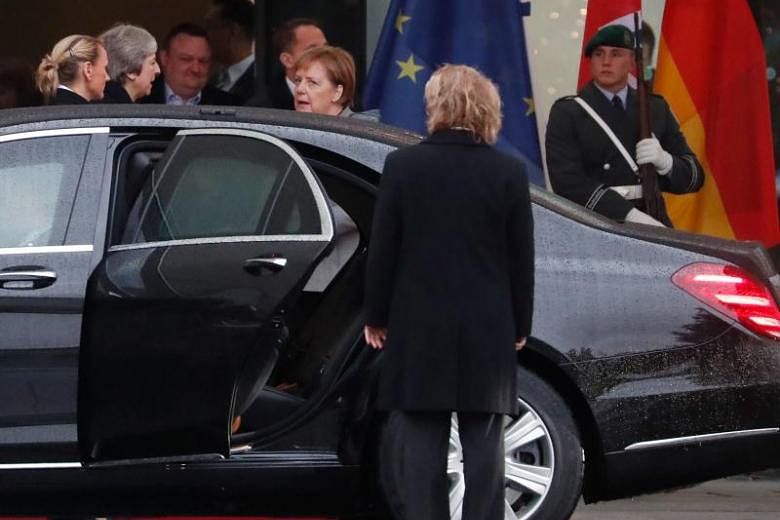BERLIN (REUTERS) - Germany's Angela Merkel and other European Union leaders ruled out more negotiations on Brexit on Tuesday (Dec 11) but were looking for ways to offer Britain reassurances after Prime Minister Theresa May pulled a parliamentary vote rather than lose heavily.
With less than four months left until Britain is due to leave the EU on March 29, Mrs May's Brexit deal is floundering, opening up prospects that run the gamut from a disorderly no-deal divorce to calling Brexit off.
A day after abruptly pulling the vote, Mrs May rushed to The Hague for breakfast with Dutch Prime Minister Mark Rutte, then to Berlin to meet Chancellor Merkel, followed by a trip to Brussels.
The message from the EU was clear: It can give legally binding assurances about how it interprets the exit treaty, but will not countenance reopening the text itself.
Mr Donald Tusk, who will chair an EU summit in Brussels on Thursday and Friday, said after talking to Mrs May: "Clear that EU 27 wants to help. The question is how."
According to two sources, Dr Merkel told her own German conservative parliamentary group there would be no more negotiations, but efforts were being made to give Britain reassurances.
Mrs May told DR Merkel that it was in nobody's interest for Britain to leave with no accord, the sources said.
European Commission head Jean-Claude Juncker said: "The deal we achieved is the best possible. It's the only deal possible. There is no room whatsoever for renegotiation.
"But of course there is room enough to give further clarifications and further interpretations without opening the withdrawal agreement."
Austrian Chancellor Sebastian Kurz, whose country holds the rotating EU presidency, echoed that view. Irish Prime Minister Leo Varadkar said Britain could still revoke or delay its departure.
VOTE BY JANUARY
The British Parliament will get its vote before Jan 21, Mrs May's spokeswoman said.
The pound, which has lost 25 cents against the US dollar since the 2016 referendum, fell again amid reports that Mrs May would face a leadership challenge.
The biggest obstacle to approval is the Irish "backstop", an insurance policy that would keep Britain in a customs union with the EU in the absence of a better way to avoid border checks between British-ruled Northern Ireland and EU member Ireland.
Mrs May's critics say it could leave Britain subject to EU rules indefinitely. The EU has said neither side wants the backstop to take effect, but it has to be part of the deal just in case.
As investors and allies tried to work out the ultimate fate of the world's fifth-largest economy, rebel lawmakers in Mrs May's party said she had to go.
"If we can't go forwards with her deal... then I'm afraid the only way to change the policy is to change the prime minister," said Brexit-supporting lawmaker Steve Baker.
A Sky News reporter said some sources were confident that the 48 letters from lawmakers needed for a challenge had been submitted, but that it would be kept under wraps while Mrs May was abroad. Other political editors said the threshold had not been reached.
With little hope of big changes from the EU, the options open to Britain range from a chaotic no-deal Brexit to risking the wrath of Brexit backers by calling the whole thing off.
Both Mrs May's Conservatives and the main opposition Labour Party have pledged to implement the result of the 2016 referendum in which Britons voted narrowly to leave the EU.
But a rising number of backbench lawmakers, along with three of four living former premiers, say the only way out of the impasse may be a new referendum with an option to stay. The EU's top court ruled this week that Britain could abandon Brexit with no consequences up until the moment it finally leaves.
Former prime minister John Major, who also faced a Conservative revolt over Europe, said Britain must revoke its divorce notice immediately.
"It's clear we now need the most precious commodity of all: time. Time for serious and profound reflection by both Parliament and people."











